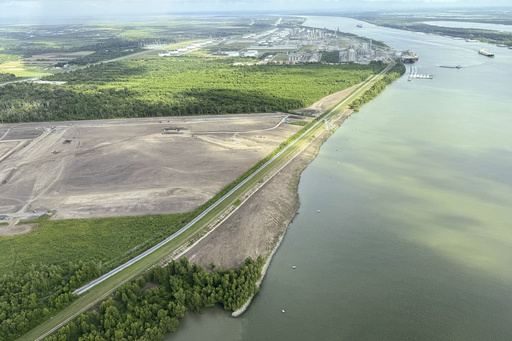
NEW ORLEANS, La.
— Federal authorities are seeking clarification on Louisiana’s resolve regarding a significant coastal restoration initiative, valued at nearly $3 billion, which has been hindered by legal disputes.
On a recent Friday, a letter addressed to the leader of Louisiana’s Coastal Protection and Restoration Authority highlighted the expectation for the state to return federal funds allocated for the Mid-Barataria Sediment Diversion project if it chooses not to proceed with the plan. Federal officials requested a “clear statement” regarding the state’s commitment to the project, though they did not specify a timeline for when this response is needed.
The Mid-Barataria Sediment Diversion project represents Louisiana’s primary effort to restore its coastline, which is deteriorating rapidly due to subsidence, erosion, and rising sea levels linked to climate change. The initiative aims to divert 75,000 cubic feet (2,100 cubic meters) of sediment per second from the Mississippi River into the Barataria Basin located in Plaquemines Parish. This is expected to generate between 20 to 40 square miles (52 to 104 square kilometers) of new land over the next fifty years.
However, following the project’s commencement in August 2023, legal action was taken by Plaquemines Parish authorities against the overseeing state agency, alleging a deficient permitting process and expressing worries about the project’s potential ramifications on local communities. Subsequently, in January, legal challenges were posed against federal agencies involved in permitting the project by local oyster businesses and an environmental organization, citing concerns over water quality, the impact on commercial fisheries, and threats to bottlenose dolphins. Consequently, the project’s progress has been stalled as negotiations continue.
Advocates, which include environmental organizations and various state lawmakers, are increasingly anxious that the project might be curtailed or even abandoned. Such an outcome would significantly undermine scientifically supported strategies to address the coastal land loss problem in a state reportedly losing land at the alarming rate of one football field every 100 minutes, according to Restore the Mississippi River Delta, an environmental coalition. The coalition articulated concerns that the current administration under Governor Jeff Landry was showing signs of hesitance regarding its commitment to this vital project.
Representatives from Landry’s office and the Coastal Protection and Restoration Authority opted not to comment on the matter.
The letter from federal officials emanated from representatives of several agencies including the Environmental Protection Agency, the National Oceanic and Atmospheric Administration, the Department of the Interior, and the Department of Agriculture.
These agencies serve as trustees that oversee federal funds linked to a settlement from the 2010 Deepwater Horizon oil spill catastrophe in the Gulf Coast, and Louisiana is included in a group of affected states utilizing these funds.
According to information shared at an October 11 state Senate hearing, the Coastal Protection and Restoration Authority indicated that $519.3 million has already been spent on the project, out of the total sum of $2.92 billion designated for its development, with $378 million allocated for mitigation and stewardship efforts supporting the communities and industries impacted by the initiative.
The federal letter specified that any returned funds would be allocated for “future restoration activities,” although it did not clarify if these funds would continue to be earmarked specifically for Louisiana projects.
Federal officials noted that the Mid-Barataria project has undergone a thorough evaluation process over several years, incorporating extensive impact mitigations for those affected by the initiative.
The letter emphasized that “no other single restoration project has been planned and studied as extensively over the past decades,” highlighting the project’s potential to diminish storm impacts on coastal communities and mitigate flooding in adjacent areas.
Ethan Melancon, advocacy director of the Coalition to Restore Coastal Louisiana, referred to the Mid-Barataria project as “the linchpin” of Louisiana’s strategy to safeguard its eroding coastline.
He argued that this initiative, which emulates natural sediment deposition processes, would ensure a continuous source of sediment to combat coastal erosion, proving to be far superior and enduring compared to alternative mitigation strategies proposed by the project’s detractors, which primarily focus on utilizing dredged materials to supposedly curtail land loss.
Federal officials also warned in their communication that there would be “no guarantee” of approval for any alternative projects presented.
